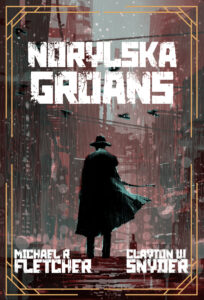
For the fourth consecutive year, I am leading a judging team in the Self-Published Science Fiction Competition (SPSFC4), and my team has been given 32 books to whittle down to two semifinalists. To start, we’ve split them up so that each team member has nine or ten books to evaluate, and together we’ll pick the top 15-25% to pass to our team members for further reading. At this stage, I DNF books more often than I finish them, so I tend not to have more than two or three full reviews. But while I was surprised to see Norylska Groans—which finished fourth-place in the Self-Published Fantasy Blog-Off—in a sci-fi competition, I’d seen enough glowing reviews that I was pretty sure Michael R. Fletcher and Clayton W. Snyder’s grim tale would receive one of those full reviews.
Norylska Groans takes place in an alternate version of the northern reaches of Russia, in a frigid city marked by poverty and organized crime. The story alternates between two perspective characters who find themselves on a collision course. A former soldier is laid off from his factory job and out of desperation takes a job with a crime family, and a housewife looking for extra money takes a job with the police that involves a lot more fieldwork than she’d bargained for. The primary speculative element involves stones that can store and transfer memory—a premise with a robust sci-fi history but that in this case is accomplished via magic in a lower-technology society—echoing the TV series Severance in the way it creates a sharp psychological divergence between characters’ work selves and home selves.
Make no mistake, this is a dark tale that revels in the blood and viscera of war, of organized crime, and even of factories that don’t particularly bother with safety precautions for their low-wage workers. Thankfully, it doesn’t dig nearly so deeply into sexual violence, though the male gaze of one of the leads is intense, and there are plenty of references to the prevalence of sexual assault in the city. The content warning list is long, and potential readers should act accordingly. But for those who don’t mind tales on the grimmer side, this is a fast and engrossing read. It’s easy to understand how both major characters end up putting themselves in such danger—even when it’s through bad decisions, it’s through understandably bad decisions—and the questioning of oneself that stems from memories that stay in the office provide a nice psychological layer underneath the action.
The action is also engrossing, though there are times it feels like a little bit too much of a whirlwind. Once the characters are put in the path of conflict, the plot accelerates rapidly, so much so that there are moments where it’s easy to wonder just why they take certain actions so quickly, and whether they might’ve better avoided harm with a little more planning. But even these cases are generally marked by external forces backing them into a corner, and if the actions in response may be rash, there are rarely other options that seem particularly safe.
Norylska Groans is hard to read at times, and there were moments I found myself skimming through particularly gory scenes, as the level of description just went farther than I prefer to read. That and a pace that sometimes moved just a bit too quickly for me to fully internalize the character motivations keeps me from repeating the gushing praise of some of the SPFBO reviewers. But this remains a quality read, with sympathetic characters, thrilling action sequences, and some genuine psychological depth. For readers with strong stomachs, it’s a good one.
For SPSFC purposes, that would be enough to recommend it for the next round. But as a book on the edge of the genre, it’s important also to evaluate whether it is a sci-fi book. Now SPSFC is an expansive competition that is happy to include science fantasy and considers alternate history to be a sci-fi subgenre. But in a book that doesn’t display a clear point of divergence from actual history except for the development and use of magical memory stones, Norylska Groans feels less like genre alt history and more like primary-world fantasy. Even though the memory magic has plenty of parallels within science fiction, I read the specific usage here as pretty thoroughly fantasy. The book’s status in the competition won’t be decided without consultation with my teammates, but while I think it’s good enough to progress, I’m not convinced it’s the right fit for the competition.
Recommended if you like: grim fantasy, stories that play with memory.
Can I use it for Bingo? It’s hard mode for Reference Materials. It is also Self-Published and features both Criminals and Dreams.
Overall rating: 15 of Tar Vol’s 20. Four stars on Goodreads.
